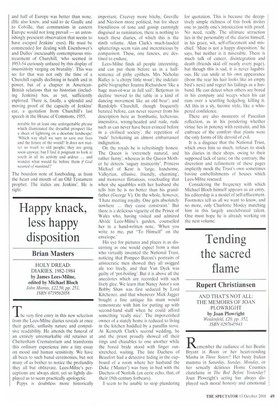Happy knack, less happy disposition
Brian Masters
HOLY DREAD: DIARIES, 1982-1984 by James Lees-Milne, edited by Michael Bloch John Murray, £22.50, pp. 251, ISBN 0719562058 he very first entry in this new selection from the Lees-Milne diaries reveals at once their gentle, unflashy nature and compulsive readability. He attends the funeral of an entirely unremarkable old retainer at Cheltenham Crematorium and transforms this ordinary experience into a tiny essay on mood and human sensitivity. We have all been to such banal ceremonies, but not many of us bother to notice the profundity they all but obliterate. Lees-Milne's perceptions are always alert, yet so lightly displayed as to seem practically apologetic.
Pepys is doubtless more historically important, Creevey more bitchy, Greville and Nicolson more political, but for sheer friendliness of tone and gossip cunningly disguised as rumination, there is nothing to touch these diaries, of which this is the ninth volume. Alan Clark's much-lauded splutterings seem vain and meretricious by comparison. These, one fancies, are destined to endure.
Lees-Milne finds all people interesting, and can put them before us in a halfsentence of pithy epithets. Mrs Nicholas Ridley is 'a chirpy little trout"; the indefatigable biographer Joanna Richardson 'like a huge man-of-war in full sail'; Betjeman in decline 'moved to the table in a kind of dancing movement like an old bear': and Randolph Churchill, though frequently berated before, can never recover from his description here as 'bombastic, lecherous, insensitive, wrong-headed and rude, rude such as can never have been evinced before in a civilised society', the repetition of 'rude' betokening an almost embarrassed indignation.
On the royals he is refreshingly honest. The Queen is 'extremely natural, and rather funny', whereas in the Queen Mother he detects `sugary insincerity'. Princess Michael of Kent is 'large, handsome, Valkyrian, effusive, friendly, charming', and moreover flirtatious, vouchsafing that when she squabbles with her husband she tells him he is no better than his grandfather (George V). On the whole, however, 'I hate meeting royalty. One gets absolutely nowhere ... they cause constraint.' But there is a delicious vignette of the Prince of Wales who, having visited and admired Alvide Lees-Milne's garden, counselled her in a hand-written note, 'When you write to me, put "To Himself' on the envelope.'
His eye for pictures and places is as discerning as one would expect from a man who virtually invented the National Trust, noticing that Pompeo Batoni's portraits of aristocratic men showed they all swigged ale too freely, and that Van Dyck was guilty of 'pot-boiling'. But it is above all the anecdotes which are recorded with such lively glee. We learn that Nancy Astor's son Bobby Shaw was first seduced by Lord Kitchener. and that whenever Mick Jagger bought a fine antique his mum would remonstrate with him for putting up with second-hand stuff when he could afford something 'really nice'. The impoverished owner of a stately home is reduced to living in the kitchen huddled by a paraffin stove. At Kenneth Clark's second wedding, he and the priest proudly showed off their rings and chasubles to one another while the bored bride stood with finger outstretched, waiting. The late Duchess of Beaufort had a detective hiding in the cupboard of a room where her husband the Duke (Master') was busy in bed with the Duchess of Norfolk (an eerie echo, that, of their 18th-century forbears).
I seem to be unable to stop plundering for quotation. This is because the deceptively simple richness of this book invites one to justify one's intoxication with proof. No need, really. The ultimate attraction lies in the personality of the diarist himself, in his grace, wit, self-effacement and mischief. 'Mine is not a happy disposition,' he says, but neither is it miserable. There is much talk of cancer, disintegration and death (friends skid off nearly every page), but though this is sad, it is never lugubrious. He can smile at his own appearance (from the rear his hair looks like an empty bird's nest) and regret his failings as a husband. He can detect when others are bored in his company and weeps when his car runs over a scuttling hedgehog, killing it. All this in a sly, laconic style, like a whispered confidence.
There are also moments of Pascalian reflection, as in his pondering whether virtue lies in potency with restraint, and his embrace of the comfort that plants were the only forms of life devoid of evil.
It is a disgrace that the National Trust, which owes him so much, refuses to stock his diaries in their shops, owing to their supposed lack of taste; on the contrary, the discretion and refinement of these pages implicitly mock the Trust's own sometimes bovine embellishments of houses which Lees-Milne rescued.
Considering the frequency with which Michael Bloch himself appears as an entry, his editorship is a model of self-effacement. Footnotes tell us all we want to know, and no more, only Charlotte Mosley matching him in this largely uncelebrated talent. One must hope he is already working on the next volume.


























































































 Previous page
Previous page